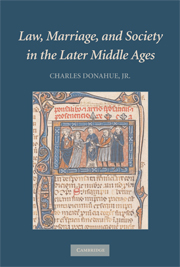Book contents
- Frontmatter
- Contents
- List of Tables
- List of Appendices
- Preface
- Acknowledgments
- Notes About This Book
- Introduction
- 1 The Background Rules and Institutions
- 2 Lying Witnesses and Social Reality: Four English Marriage Cases in the High Middle Ages
- 3 Statistics: The Court of York, 1300–1500
- 4 Story-Patterns in the Court of York in the Fourteenth Century
- 5 Story-Patterns in the Court of York in the Fifteenth Century
- 6 Ely
- 7 Paris
- 8 Cambrai and Brussels: The Courts and the Numbers
- 9 Cambrai and Brussels: The Content of the Sentences
- 10 Divorce a mensa et thoro and salvo iure thori (Separation)
- 11 Social Practice, Formal Rule, and the Medieval Canon Law of Incest
- 12 Broader Comparisons
- Epilogue and Conclusion
- Bibliography and Abbreviations
- Subject Index
- Texts and Commentary
- Table of Cases
- Table of Authorities
- Index of Persons and Places
Epilogue and Conclusion
Published online by Cambridge University Press: 14 July 2009
- Frontmatter
- Contents
- List of Tables
- List of Appendices
- Preface
- Acknowledgments
- Notes About This Book
- Introduction
- 1 The Background Rules and Institutions
- 2 Lying Witnesses and Social Reality: Four English Marriage Cases in the High Middle Ages
- 3 Statistics: The Court of York, 1300–1500
- 4 Story-Patterns in the Court of York in the Fourteenth Century
- 5 Story-Patterns in the Court of York in the Fifteenth Century
- 6 Ely
- 7 Paris
- 8 Cambrai and Brussels: The Courts and the Numbers
- 9 Cambrai and Brussels: The Content of the Sentences
- 10 Divorce a mensa et thoro and salvo iure thori (Separation)
- 11 Social Practice, Formal Rule, and the Medieval Canon Law of Incest
- 12 Broader Comparisons
- Epilogue and Conclusion
- Bibliography and Abbreviations
- Subject Index
- Texts and Commentary
- Table of Cases
- Table of Authorities
- Index of Persons and Places
Summary
By the sixteenth century, Alexander's rules about the formation of marriage were in trouble. There was, to begin with, the difficulty of proof of informal marriages, something that we saw in Dolling c Smith and in dozens of cases like it. Partially in response to this problem, the Fourth Lateran Council in 1215 had required couples to have banns of marriage proclaimed publicly before they married, but the council had not invalidated marriages that simply complied with Alexander's rules. Secondly, Alexander's rules encountered opposition in those portions of society where marital property was important. In particular, the Roman lawyers kept alive the tradition that parental consent was necessary for the validity of a marriage, and the Roman rules on dowry and customary rules about community property affected – adversely, it would seem, to women in particular – the equality that seems to lie at the root of Alexander's rules.
It would seem that the French proved particularly resistant to Alexander's rules. There was nothing that the French could do about the law of the universal church that said that informal marriages were valid, but, as we have seen, French local councils throughout the Middle Ages proclaimed that those who married without the usual ecclesiastical solemnities were automatically excommunicated. The reformers were quick to attack Alexander's rules. For both Luther and Calvin they violated the fundamental principle of the authority of fathers in managing the affairs of their families, including the authority to determine whom their children would marry.
- Type
- Chapter
- Information
- Law, Marriage, and Society in the Later Middle AgesArguments about Marriage in Five Courts, pp. 633 - 640Publisher: Cambridge University PressPrint publication year: 2008



